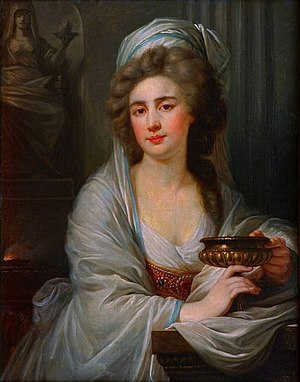Discover Your Roots
SIGN UPDiscover Your Roots
SIGN UPZofia is a female given name of Polish origin, derived from the Old Greek word for "wisdom." This elegant name carries the beautiful meaning of wisdom, reflecting qualities of insight, intelligence, and knowledge. It is a variant of the name Sofia and is widely used in Polish-speaking regions. Throughout history, many notable individuals have borne the name Zofia, including artists, scholars, athletes, and historical figures. Zofia's significance as a name is deeply rooted in its association with wisdom and intellectual prowess. From ancient origins to modern usage, Zofia embodies a sense of intelligence and sagacity. With its rich history and meaningful connotations, Zofia continues to be cherished as a name that symbolizes wisdom and intellectual depth.

Zofia Potocka (née Clavone; 11 January [O.S. 1 January] 1760 – 24 November 1822) lived an extraordinary life that saw her transition from being a Greek slave courtesan to becoming a renowned Polish noblewoman. Born in the Turkish city of Bursa, her early life was marked by hardships and uncertainties, including the loss of her father and stepfather. At a young age, she was sold to the Polish Ambassador, which eventually led to her marriage to Polish Count Major Józef de Witte. As they traveled across Europe, Zofia captivated the aristocracy with her beauty and wit, earning the title "The most beautiful woman in Europe." Her encounters with powerful personalities, including monarchs and ministers, added to her allure and notoriety. Her association with Prince Potemkin, the Russian military leader, during the Russo-Turkish War further solidified her adventurous and influential role. Zofia Potocka's life is a testament to her resilience, adaptability, and undeniable impact on the European social and political landscape during her time.

Zofia Filipowiczowa, a Polish woman who lived in the 17th century, gained historical notoriety when she was accused of witchcraft. Alongside three other women, she faced prosecution in Gajona after being accused by nobleman Paweł Podlodowski of causing the death of his father, Jan Podlodowski, and conspiring to harm him as well. Following a trial, she and her accused accomplices were found guilty and sentenced to whipping and exile. The case against her has been widely portrayed in literature and theater, playing a significant role in local folklore. This dramatic episode was later depicted in Józefowi Ziębie's novel "Zofijej Filipowiczowej czary czyniącej i za czary skazanej," further cementing its place in history. The story of Zofia Filipowiczowa serves as a testament to the complexities and injustices of the witchcraft trials that occurred in Poland during the 15th to 18th centuries.



All images displayed on this page are sourced from Wikipedia or Wikimedia Commons.We use these images under their respective Creative Commons or public domain licenses. Wherever applicable, author attributions and license information are provided. If you believe an image is used incorrectly or outside its license terms, please contact us so that we can review and correct the issue.